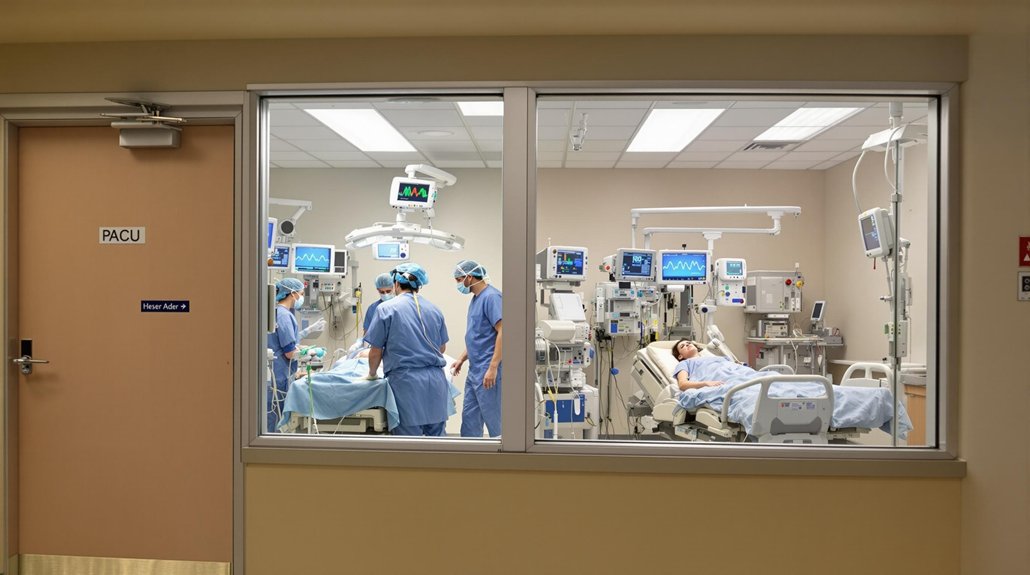Perioperative care guides you through three essential stages during your surgical journey. The preoperative stage involves preparation and assessment, including medical histories and physical exams. During the intraoperative stage, you’ll receive care in the operating room with careful monitoring and pain management. The postoperative stage focuses on your recovery and monitoring in phases, from immediate care to discharge planning. Understanding these stages will help you better prepare for your surgical experience.
The Preoperative Stage: Preparation and Assessment
Before any surgical procedure begins, the preoperative stage establishes the foundation for a successful operation and recovery. During this essential phase, you’ll focus on gathering extensive medical histories, conducting physical examinations, and performing necessary diagnostic tests to guarantee your patient’s readiness for surgery.
Risk assessment plays a significant role as you evaluate potential complications, review current medications, and identify any underlying health conditions that could impact the procedure.
Thorough preoperative risk assessment helps identify potential complications, ensuring patient safety and optimal surgical outcomes.
You’ll also provide thorough patient education, explaining the surgical process, potential risks, and expected outcomes. This includes discussing preoperative instructions like fasting requirements, medication adjustments, and hygiene protocols.
Your careful attention to these preoperative details helps create a safer surgical environment and empowers your patients to actively participate in their care journey. Emotional support services play a vital role in helping patients manage anxiety and stress during the preoperative preparation phase.
The Intraoperative Stage: During Surgery Care
Once preoperative preparations are complete, the intraoperative stage begins as the patient enters the operating room. During this critical phase, you’ll work alongside the surgical team to maintain patient safety and comfort throughout the procedure.
Your responsibilities include monitoring essential signs, managing pain control, and ensuring proper positioning of the patient.
Anesthesia management becomes paramount as you assist in maintaining the appropriate depth of sedation while supporting respiratory and cardiovascular function. You’ll need to document all interventions, medications, and patient responses accurately.
The surgical team relies on your vigilant monitoring of blood loss, fluid balance, and temperature regulation. You’ll also help maintain the sterile field and anticipate the surgeon’s needs by having necessary instruments and supplies ready.
This stage continues until the surgical procedure is complete.
Focus Family Care provides comprehensive perioperative support to ensure optimal outcomes both during and after surgery.
The Postoperative Stage: Recovery and Monitoring
After surgery concludes, patients enter the postoperative stage in the Post-Anesthesia Care Unit (PACU) or recovery room. During this stage, healthcare providers monitor essential signs, manage pain, and watch for potential complications. You’ll need to guarantee a smooth changeover from surgical care to recovery.
| Recovery Phase | Key Actions |
|---|---|
| Immediate | Monitor vitals, assess pain |
| Intermediate | Begin mobility, start oral intake |
| Extended | Plan discharge, provide education |
Your postoperative care focuses on pain management through medications and comfort measures. You’ll track the patient’s response to treatment while preparing for discharge planning. This includes teaching patients about medication schedules, wound care, and follow-up appointments. You’ll also provide instructions for at-home recovery and warning signs that require medical attention. Success in this stage depends on clear communication and thorough documentation. Skilled nursing services provide specialized wound care and medication support to ensure proper healing during the transition from hospital to home.
Conclusion
Understanding these three stages of surgical care is like having a well-drawn map for your journey. The preoperative preparation gets you ready for surgery, just as you’d prepare for an important trip. During the surgery itself, your medical team watches over you like careful guardians. Then, in recovery, they walk beside you step-by-step as you heal and get stronger.
You’re never alone in this process – think of it as having a trusted team of friends looking out for you at every turn. When all three stages work together smoothly, you’re much more likely to have a safe surgery and bounce back faster.
Remember, it’s natural to feel nervous about surgery, but you don’t have to figure this out by yourself. Focus Family Care‘s experienced team is here to support you and your loved ones every step of the way.
If you or a loved one need help, don’t wait. Reach out to Focus Family Care today at (561) 693-1311 or email us at info@focusfamilycare.com.




